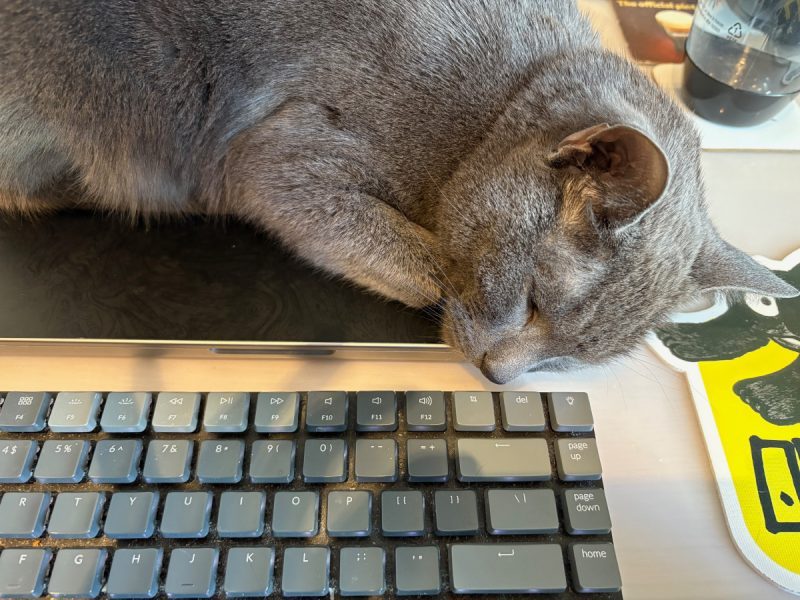
Welcome to the Wednesday Cats of Catster! Every week, we share a story from one of our cat-loving Catsters. This week is about Wes and his fiercely cuddly Russian Blue, Raphael.
A friend visited me the other day who met Raphael when he was only a tiny little lump, and said: “Well, he’s much more relaxed now than he was when I first met him!” Of course, he was referring to the dark, the terrible, the dangerous, tyrannosaurus-kitten period, an age of cat ownership that I’m sure many readers here will be familiar with. This was an era when a fierce little bundle of grey fur roamed the floors, its sharp fangs and even sharper claws sinking into any piece of passing flesh it spotted, furiously bunny-kicking and gnawing its way to ecstasy – and our agony! That was, admittedly, a difficult period for visitors. Everyone loves a cute kitten when it’s cuddled up, purring, and calm. However, to the non-cat familiar in our life, they perhaps didn’t fully appreciate that this serene moment was one side of a particularly potent deal. Soon to be shattered once Raphy arose from his gentle slumber.
Of course, my friend is correct; now that Raphael has grown into himself, his calm confidence has developed, too. He’s a mature man about town now. This older, wiser, and more elegant Raphael still demonstrates elements of kitten-like behaviour, though – he loves a bare ankle (not a bear ankle, which would be a far more distressing occasion). He adores a fierce bite after having too many loving cuddles, and he sometimes can’t help getting those claws out when he wants to really…punctuate his point.
But does he mean to be mean?
‘The Strange Case of Dr Jekyll and Mr Hyde’ was a Victorian novella written by Robert Louis Stevenson. I hope I’m not providing too many spoilers for the 100+ year old text when I tell you that the tale centered around a doctor who utilised a serum to transform himself into another being for his devilish deeds, but before he knew it, he could control it no more. It struck me on reading it recently that this is exactly what most cat owners face on a daily basis!
When he was a kitten, Raphael’s evil misdeeds were understandably part of the learning process; he was developing boundaries and understanding what it meant to live in this world. That was why we always followed the advice to immediately stop cuddling him when he acted out, so that he understood what was and wasn’t ok.
But of course, he’s a cat; there’s only so much even the best and most careful “training” can do to smooth the edges of a semi-feral (albeit cute) little house beast.
Sometimes when he goes to set upon me in some bloodthirsty and ravenous attack, from the depths of my throat, I let out a small involuntary yelp, and there flashes across that fluffy little visage a look of pure sadness and regret, a look to say, “I’m so sorry, I absolutely don’t know what came over me, I shall never do that again…”
In that moment, Raphael is in fact Dr Jekyll, having quickly used his serum to placate Mr Hyde once more.
Obviously, our cats don’t mean to be mean; they can’t help it, and they can’t control it. Just like Dr Jekyll, they are powerless eventually to the internal forces that take hold of them, and they have to let Mr Hyde in.
But it still hurts when they do let him in. Not just physically (of course it hurts physically), but emotionally, too. Every time we think it will be different, as we sit there for longer than usual petting away, we think, “Maybe not this time.” As those claws sink into our skin, we think, “No, I was wrong again”.
What about you? Does your cat sometimes struggle with Mr Hyde? Or deep down, do they mean to be mean?
- Read his previous article: Kitty Playtime: What Raphael’s Hunt Taught Me About Life